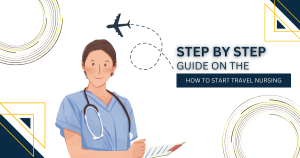How to Start Travel Nursing
Embarking on a Fulfilling Journey: How to Start Travel Nursing
Discover the essential steps to kickstart your journey in travel nursing. Learn key tips and resources for a successful start.
In the realm of healthcare, travel nursing has become a sought-after career path for those seeking adventure, professional growth, and the opportunity to make a positive impact across diverse healthcare settings.
If you’re considering how to start travel nursing, this comprehensive guide will provide you with actionable steps to navigate the exciting world of temporary nursing assignments, allowing you to embark on a fulfilling journey.
Understanding the Basics of Travel Nursing
Before delving into the steps to start travel nursing, it’s essential to have a solid understanding of what travel nursing entails.
Travel nurses are registered nurses who take on temporary assignments in different locations, typically ranging from 8 to 26 weeks.
These assignments offer the chance to work in various healthcare facilities, adapt to new environments, and experience different aspects of nursing practice.
Step-by-Step Guide on How to Start Travel Nursing

1. Assess Your Qualifications and Experience
The first step in starting your travel nursing journey is to assess your qualifications and experience.
Travel nursing agencies often prefer candidates with a minimum of one to two years of clinical experience.
Ensure your nursing license is in good standing, and consider obtaining certifications in specialties that align with your career goals.
2. Research Travel Nursing Agencies

Explore reputable travel nursing agencies to find the right fit for your career aspirations. Look for agencies with a solid track record, positive reviews from other travel nurses, and a wide range of assignments in locations that interest you. Research their recruitment process, benefits, and support services.
3. Compile Your Documents
Gather essential documents required for the travel nursing application process. These typically include your resume, nursing license, certifications, immunization records, and professional references. Having these documents readily available will streamline the application process.
4. Submit Applications to Selected Agencies
Once you’ve identified potential travel nursing agencies, submit your applications. Be prepared to complete the agency’s online application form, and provide accurate and detailed information about your qualifications and preferences.
Some agencies may conduct initial interviews to better understand your skills and preferences.
5. Complete Necessary Evaluations and Tests
Many travel nursing agencies require candidates to complete evaluations and tests to assess their clinical skills and knowledge.
These evaluations may include specialty-specific exams and proficiency assessments. Prepare thoroughly for these evaluations to showcase your expertise.
6. Consider Your Preferred Locations
When starting travel nursing, consider the locations you are interested in exploring. Whether it’s bustling city life, serene rural areas, or coastal communities, choose assignments that align with your lifestyle and preferences. Be open to diverse experiences that will enrich your personal and professional life.
7. Review Assignment Offers Carefully
Once you receive assignment offers from travel nursing agencies, could you review them carefully? Consider factors such as the location, duration of the assignment, pay package, and benefits. Communicate openly with your agency to negotiate terms and ensure the assignment aligns with your goals.
8. Prepare for Travel and Housing
Upon accepting an assignment, start preparing for your travel. Coordinate with the agency to arrange housing, whether it’s provided by the facility or through agency assistance. Ensure you have the licenses and certifications for the state where you’ll practice.
9. Embrace the Adventure
As you embark on your travel nursing assignment, embrace the adventure and be open to new experiences. Network with colleagues, explore the local culture and contribute your skills to enhance patient care.
Building positive relationships and adapting to new environments are key elements of a successful travel nursing experience.
10. Evaluate and Plan for Future Assignments
After completing your first travel nursing assignment, take time to evaluate the experience. Consider what worked well and areas for improvement.
If you enjoyed the lifestyle and benefits of travel nursing, plan for future assignments and explore new locations to diversify your experiences further.
Challenges and Considerations in Starting Travel Nursing
Adapting to Different Work Environments
One of the challenges in travel nursing is adapting quickly to different work environments. Develop strong communication skills and a flexible mindset to navigate various healthcare settings seamlessly.
Dealing with Transient Relationships
Travel nurses often form temporary relationships with colleagues and patients. While this can be enriching, it may also pose challenges in terms of building long-term connections. Stay open to new friendships while maintaining a professional approach.
Managing Licensing and Certifications
Keeping up with licensing and certifications for different states can be demanding. Stay organized and plan to ensure all credentials are up-to-date and aligned with the requirements of each assignment.
Conclusion About How to Start Travel Nursing
In conclusion, starting travel nursing is a journey that offers not only professional growth but also the chance to explore new places and make a positive impact in healthcare.
By following these steps and considering the challenges, you can embark on a rewarding career that combines your passion for nursing with a sense of adventure.
Embrace the opportunities, build a diverse skill set, and let each assignment contribute to the tapestry of your unique travel nursing experience.


